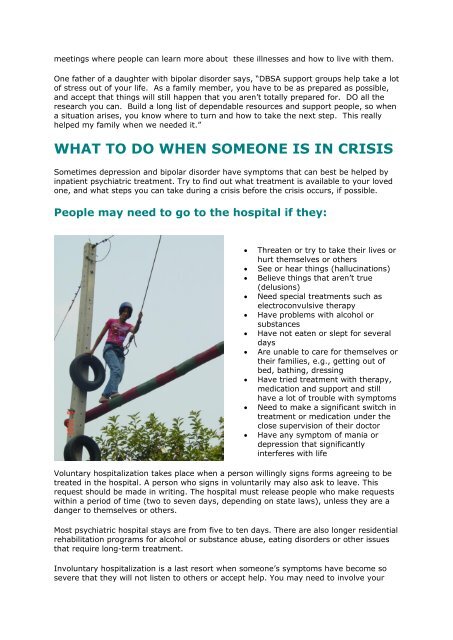CODEPENDENCE - DEAN AMORY
PERSONALITY DISORDER, CODEPENDENCE, RELATIONSHIPS, PSYCHOLOGY, LOVE, MATRIMONY, LIFE, LIVE,
PERSONALITY DISORDER, CODEPENDENCE, RELATIONSHIPS, PSYCHOLOGY, LOVE, MATRIMONY, LIFE, LIVE,
You also want an ePaper? Increase the reach of your titles
YUMPU automatically turns print PDFs into web optimized ePapers that Google loves.
meetings where people can learn more about these illnesses and how to live with them.<br />
One father of a daughter with bipolar disorder says, “DBSA support groups help take a lot<br />
of stress out of your life. As a family member, you have to be as prepared as possible,<br />
and accept that things will still happen that you aren’t totally prepared for. DO all the<br />
research you can. Build a long list of dependable resources and support people, so when<br />
a situation arises, you know where to turn and how to take the next step. This really<br />
helped my family when we needed it.”<br />
WHAT TO DO WHEN SOMEONE IS IN CRISIS<br />
Sometimes depression and bipolar disorder have symptoms that can best be helped by<br />
inpatient psychiatric treatment. Try to find out what treatment is available to your loved<br />
one, and what steps you can take during a crisis before the crisis occurs, if possible.<br />
People may need to go to the hospital if they:<br />
Threaten or try to take their lives or<br />
hurt themselves or others<br />
See or hear things (hallucinations)<br />
Believe things that aren’t true<br />
(delusions)<br />
Need special treatments such as<br />
electroconvulsive therapy<br />
Have problems with alcohol or<br />
substances<br />
Have not eaten or slept for several<br />
days<br />
Are unable to care for themselves or<br />
their families, e.g., getting out of<br />
bed, bathing, dressing<br />
Have tried treatment with therapy,<br />
medication and support and still<br />
have a lot of trouble with symptoms<br />
Need to make a significant switch in<br />
treatment or medication under the<br />
close supervision of their doctor<br />
Have any symptom of mania or<br />
depression that significantly<br />
interferes with life<br />
Voluntary hospitalization takes place when a person willingly signs forms agreeing to be<br />
treated in the hospital. A person who signs in voluntarily may also ask to leave. This<br />
request should be made in writing. The hospital must release people who make requests<br />
within a period of time (two to seven days, depending on state laws), unless they are a<br />
danger to themselves or others.<br />
Most psychiatric hospital stays are from five to ten days. There are also longer residential<br />
rehabilitation programs for alcohol or substance abuse, eating disorders or other issues<br />
that require long-term treatment.<br />
Involuntary hospitalization is a last resort when someone’s symptoms have become so<br />
severe that they will not listen to others or accept help. You may need to involve your


















